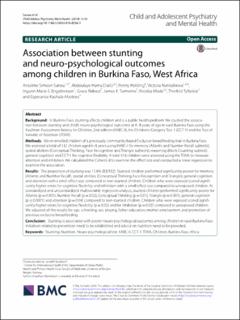| dc.contributor.author | Sanou, Anselme Simeon | |
| dc.contributor.author | Diallo, Abdoulaye Hama | |
| dc.contributor.author | Holding, Penny | |
| dc.contributor.author | Nankabirwa, Victoria | |
| dc.contributor.author | Engebretsen, Ingunn Marie S. | |
| dc.contributor.author | Ndeezi, Grace | |
| dc.contributor.author | Tumwine, James K | |
| dc.contributor.author | Meda, Nicolas | |
| dc.contributor.author | Tylleskär, Thorkild | |
| dc.contributor.author | Kashala-Abotnes, Espérance | |
| dc.date.accessioned | 2021-03-12T12:27:01Z | |
| dc.date.available | 2021-03-12T12:27:01Z | |
| dc.date.created | 2018-12-14T11:31:22Z | |
| dc.date.issued | 2018 | |
| dc.identifier.issn | 1753-2000 | |
| dc.identifier.uri | https://hdl.handle.net/11250/2733167 | |
| dc.description.abstract | Background
In Burkina Faso, stunting affects children and is a public health problem. We studied the association between stunting and child’s neuro-psychological outcomes at 6–8 years of age in rural Burkina Faso using the Kaufman Assessment Battery for Children, 2nd edition (KABC-II), the Children’s Category Test 1 (CCT-1) and the Test of Variable of Attention (TOVA).
Methods
We re-enrolled children of a previously community-based Exclusive breastfeeding trial in Burkina Faso. We assessed a total of 532 children aged 6–8 years using KABC-II for memory (Atlantis and Number Recall subtests), spatial abilities (Conceptual Thinking, Face Recognition and Triangle subtests), reasoning (Block Counting subtest), general cognition and CCT-1 for cognitive flexibility. A total 513 children were assessed using the TOVA to measure attention and inhibition. We calculated the Cohen’s d to examine the effect size and conducted a linear regression to examine the association.
Results
The proportion of stunting was 15.6% (83/532). Stunted children performed significantly poorer for memory (Atlantis and Number Recall), spatial abilities (Conceptual Thinking, Face Recognition and Triangle), general cognition and attention with a small effect size compared to non-stunted children. Children who were exposed scored significantly higher errors for cognitive flexibility and inhibition with a small effect size compared to unexposed children. At standardized and unstandardized multivariable regression analysis, stunted children performed significantly poorer for Atlantis (p = 0.001), Number Recall (p = 0.02), Conceptual Thinking (p = 0.01), Triangle (p = 0.001), general cognition (p ≤ 0.0001) and attention (p = 0.04) compared to non-stunted children. Children who were exposed scored significantly higher errors for cognitive flexibility (p = 0.02) and for inhibition (p = 0.02) compared to unexposed children. We adjusted all the results for age, schooling, sex, playing, father education, mother employment and promotion of previous exclusive breastfeeding.
Conclusion
Stunting is associated with poorer neuro-psychological outcomes among children in rural Burkina Faso. Initiatives related to prevention need to be established and advice on nutrition need to be provided. | en_US |
| dc.language.iso | eng | en_US |
| dc.publisher | BMC | |
| dc.rights | Navngivelse 4.0 Internasjonal | * |
| dc.rights.uri | http://creativecommons.org/licenses/by/4.0/deed.no | * |
| dc.title | Association between stunting and neuro-psychological outcomes among children in Burkina Faso, West Africa | en_US |
| dc.type | Journal article | en_US |
| dc.type | Peer reviewed | en_US |
| dc.description.version | publishedVersion | en_US |
| dc.rights.holder | Copyright The Author(s) 2018. | en_US |
| dc.source.articlenumber | 30 | en_US |
| cristin.ispublished | true | |
| cristin.fulltext | original | |
| cristin.qualitycode | 1 | |
| dc.identifier.doi | 10.1186/s13034-018-0236-1 | |
| dc.identifier.cristin | 1643226 | |
| dc.source.journal | Child and Adolescent Psychiatry and Mental Health (CAPMH) | en_US |
| dc.source.40 | 12 | |
| dc.source.14 | 30 | |
| dc.relation.project | Norges forskningsråd: 223269 | en_US |
| dc.identifier.citation | Child and Adolescent Psychiatry and Mental Health. 2018, 12, 30. | en_US |
| dc.source.volume | 12 | en_US |

